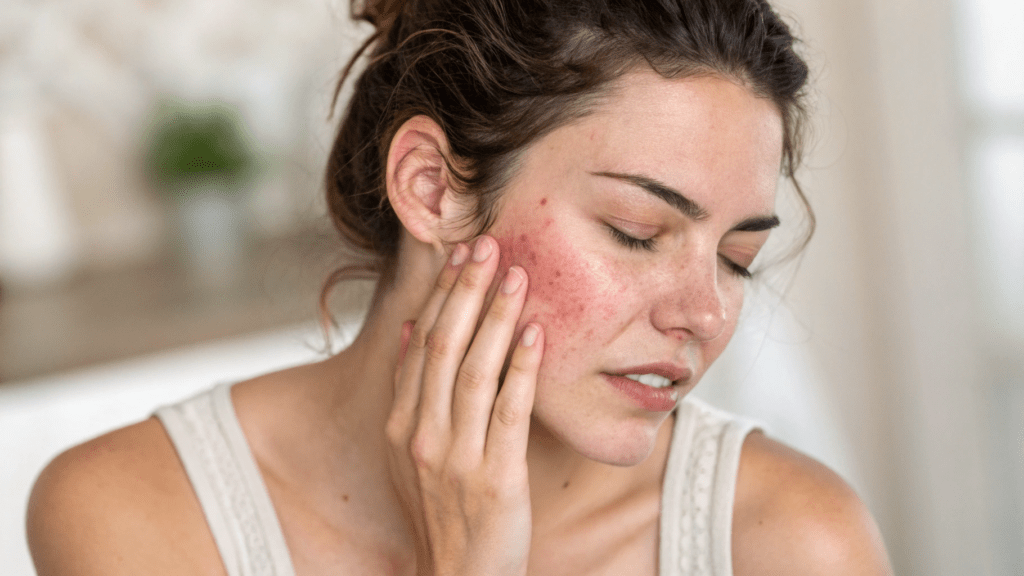
Silicones in skincare sound fancy, right? They glide onto your skin like silk, make your foundation look flawless, and give your moisturizer that oh-so-smooth finish. But here’s the thing—beneath that velvety texture lies a dirty secret. These sneaky little ingredients might be clogging your pores, trapping bacteria, and irritating your skin. Yikes!
If you’ve ever wondered, “Are silicones bad for my skin?” the short answer is: probably. Before you panic and toss out your entire beauty stash, let’s break it down.
What Are Silicones? (Besides Sneaky Little Imposters)

Silicones are synthetic ingredients commonly found in moisturizers, primers, and even shampoos. They work by creating that smooth, soft feeling we all love. However, not all silicones are the same. In fact, the most common types you’ll spot on labels include:
Dimethicone – Often found in everything from primers to lotions, it gives products a silky, spreadable texture.
Cyclopentasiloxane – Sounds fancy, but it’s just a lightweight silicone.
Cyclohexasiloxane – A tongue twister that’s also a common skincare additive.
The Downside of Silicones (Why Your Skin Might Be Screaming for Help)

At first, silicones seem harmless. They feel luxurious, blur imperfections, and make your skin look amazing—like a real-life Instagram filter! But here’s where things get tricky.
1. They Trap Dirt and Bacteria
Silicones create a barrier on your skin. That might sound good (yay, hydration!), but it can also lock in dirt, oil, and bacteria. If you’re prone to breakouts, silicones might be making things worse.
2. They Don’t Actually Hydrate Your Skin
Sure, they feel moisturizing, but it’s all an illusion. Silicones don’t provide actual hydration—they just sit on top of your skin. It’s like putting a plastic wrap over your face and calling it “hydrated.”
3. They Can Prevent Other Ingredients from Working
If your skincare routine is packed with serums, actives, and all the good stuff, silicones might be blocking them from absorbing properly. Imagine applying expensive skincare products, only to have them sit on top like an unwelcome guest. Not cool.
Who Should Definitely Avoid Silicones?

🚨 Dealing with acne? Silicones can trap oil and bacteria, leading to even more breakouts.
🚨 Sensitive skin acting up? These ingredients often trigger redness, irritation, and discomfort.
🚨 Big on layering skincare? Silicones create a barrier that might block your favorite products from fully absorbing.
Nodding along? It might be time to switch to silicone-free skincare for a happier, healthier complexion!
How to Spot Silicones in Your Skincare (Check Your Labels!)
Not sure if your products contain silicones? Look for ingredients ending in -cone, -siloxane, or -conol. Some common culprits include:
- Dimethicone
- Cyclopentasiloxane
- Methicone
If you see these lurking on your ingredient list, you might want to rethink your routine.Silicone-Free Alternatives (Your Skin Will Thank You!)

Now that we’ve exposed the truth about silicones, let’s talk better options. Instead of relying on synthetic fillers, look for natural, skin-loving alternatives like:
- Hyaluronic Acid – Not only is it super hydrating, but it’s also lightweight and absorbs quickly.
- Squalane – This skin-friendly oil doesn’t just moisturize; it also won’t clog pores, making it perfect for all skin types.
- Aloe Vera – Known for its soothing properties, it calms irritation while providing real, lasting moisture.
- Shea Butter – More than just a moisturizer, it locks in hydration without leaving your skin feeling heavy or greasy.
The best part? These alternatives actually nourish your skin, rather than just making it look good temporarily.Final Thoughts: Should You Ditch Silicones?
If you want glowing, healthy skin that actually breathes, then yes—avoiding silicones is a smart move. While they’re not the worst ingredient in skincare, they can cause buildup, block beneficial ingredients, and contribute to breakouts and irritation.
So, what do you think? Have you ever had a skincare nightmare thanks to silicones? Let’s chat in the comments! 👇



